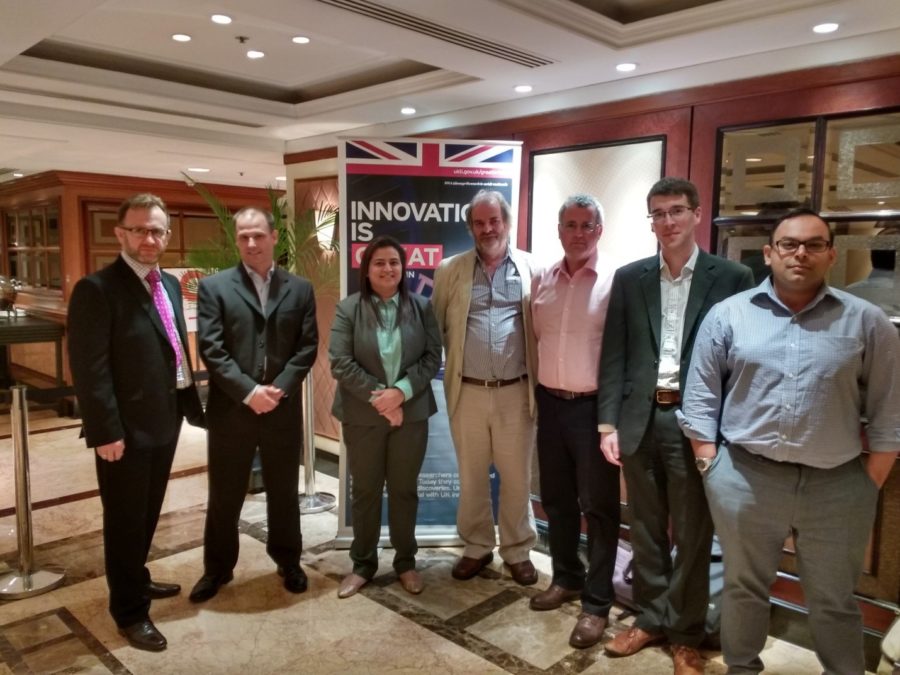In India it is believed every new activity should be planned on an auspicious day for future success. So when the UK Science and Innovation Network (SIN) organised a 3-day programme in Mumbai and Chennai for UK academics it fell (somewhat coincidentally) across Ganesh Chaturthi, Eid and Onam from 12-14 September 2016.
Industrial biotechnology is considered as one of the important sectors in both the emerging and developed economies. The sector has witnessed profound growth with the advancements in the pharmaceuticals, vaccines, enzymes, bioprocess and bio-fuel industries. As trailed in a previous blog, ‘Coming soon: UK-India workshop on industrial biotechnology‘, we delivered a programme on industrial biotechnology and took the opportunity to showcase the hugely exciting India-UK TECH Summit which will take place in New Delhi, 7-9 November.
Our programme covered a series of presentations along with group activities and networking sessions with the leading UK and Indian research institutes from 12-14 September 2016. The UK delegation included six experts from Biotechnology and Biological Sciences Research Council (BBSRC), Centre for Process Innovation (CPI) – Industrial Biotechnology and Biorefining, CPI – Biologics and various leading UK universities including University of Nottingham, University of Kent and University College London.
The objective was to engage UK and Indian experts across academia and industry to identify areas of collaboration between the UK and India. On a beautiful rainy day in Mumbai, we had leading Indian speakers from the Institute of Chemical Technology (ICT) Mumbai, Indian Institute of Technology Mumbai, National Chemical Laboratory Pune and International Centre for Genetic Engineering and Biotechnology Delhi. Following a welcome address by Colin Wells, Deputy Head of Mission, British Deputy High Commission Mumbai, it was fascinating drilling down in specialist topics including synthetic biology, fermentation technology, vaccines, enzymes etc.
With colleagues from the Department of International Trade (DIT), we organised a focused session with the CPI and select Indian companies. The aim was to understand how the CPI supports universities, small and medium-sized enterprises (SMEs) and large companies in the UK overcome the challenge of commercializing research in taking forward new products or processes. This innovation challenge in India is a key focus of our work – and is an area the bilateral Newton-Bhabha Fund is attempting to address under the Joint Industrial Collaborative R&D Programme led by Innovate UK and Global Innovation & Technology Alliance (GITA).
The second day began with a site visit to the Department of Biotechnology (DBT) – ICT Centre for Energy Bioscience (CEB), Mumbai. The visit included a tour of the impressive facilities that focused on algal biotech, synthetic biotech, enzyme technology, fermentation technology, bio-fuels and separation technology. Dr Arvind Lali, Head of DBT-ICT-CEB concluded the visit and shared information on India’s First 2G – Alcohol Demo Plant in Uttarakhand under the Make in India initiative. Following a meeting with research leads there was lot of potential touching points for joint collaboration between UK and Indian counterparts in Mumbai. Next stop was a short-hop flight to Chennai.
On arrival we received a warm south Indian style welcome with the city all set to celebrate Onam. We started the workshop with the opening remarks from Bharat Joshi, British Deputy High Commissioner Chennai where Indian speakers included representation from Anna University Chennai, Cellzyme Biotech Chennai and Biotechnology Division of Aban Infrastructure Ltd Coimbatore.
The programme designed had a strong focus on group activities to discuss the strengths, needs and potential partnership areas under industrial biotechnology. The interactions really demonstrated good synergies with some initial discussions already taking place in areas such as synthetic biology, bioprocess engineering, biopharmaceuticals, enzymes, fermentation technology, biocatalysis and bio-fuels. The programme also covered information on several resources such as funding opportunities and research networks in the UK, which I wrote about earlier in a blog.
For more information, please read the programme summary report.
We concluded the programme and highlighted the upcoming India- UK TECH Summit in Delhi, 7-10 November. The summit is open to all and the focus areas include smart cities, advanced engineering, fast-growing tech, digital, healthcare, life sciences, agri-tech, cyber, innovation, entrepreneurship, intellectual property and design and education. To register please visit the TECH Summit website.

